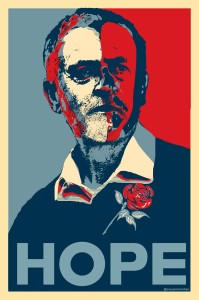When we are baffled about what we might do with respect to a particular problem, it can be worthwhile first to consider what not to do. Here are some examples.
Donald Trump, the Republican presidential candidate, has called for compulsory registration of all Muslims in the United States. Here is a perfect example of historical ignorance leading to morally repugnant thinking. Anyone who has any historical sense whatsoever will immediately ask – what next? Shall they be required to wear yellow stars sewn into their clothing? This is how the evils of Nazism began to take root in 1930s Germany. The Holocaust did not happen all at once but rather the human rights of Jewish people were progressively dismantled over time. First the Jews were identified, then they were segregated, then they were shipped in cattle trucks to Auschwitz. We cannot defend an open and tolerant society by disregarding all the human rights that make us who we are. Let us trust that Mr Trump quickly sees the error in his thinking and abandons these evil plans.
Our Prime Minister, David Cameron, has called for our country to join in with air strikes in Syria. Please remind me: who we are trying to attack at the moment, Mr Cameron? After all, a few years back you were calling for air strikes against the forces of Assad, and supporting what became ISIS. Now we want to support Assad against ISIS? Is that with the Russians or against them? Is that with the Turkish government (presently profiting hugely from the oil sales that come via ISIS) who are our NATO ally or not? Committing our armed forces to an area of conflict, where our past actions bear a significant burden of responsibility for shaping the present fiasco, must surely be based upon extremely clear and convincing reasons, ideally ones which command wide public assent. Without those things a desire to act militarily is just so much knee-jerk posturing.
Earlier this year the Prince of Wales visited Saudi Arabia to pay his personal condolences to the Royal Family following the death of their King. In amongst other matters there was doubtless discussion about the ongoing major arms sales to the Saudi regime. After all, the UK has been selling arms to the Saudis for many years. Some of those sales were even investigated by the Serious Fraud Office, until political pressure forced them to stop. Let’s remember what Saudi Arabia is – it is a feudal monarchy that retains the death penalty for gays and adulterers and from that country came 19 out of the 20 hijackers on 9/11. The particular strain of Islamist nutjobbery which dominates ISIS has clear roots in the Wahhabi ideology which is dominant in Saudi Arabia. This ideology cannot tolerate any compromise with the West – and it is this ideology which is preached in all the mosques financially backed by the Saudis throughout the world, including many in the UK. Perhaps we need to be clearer as to which sorts of ideology help mutual flourishing in our society, and which do not?
If we are to engage constructively with this present crisis we would surely benefit from some clear and honest thinking and conversation about these issues. We face an ideology that is committed to the destruction of our western ways of life. As a minimum, might I propose that we stop financially and militarily supporting that ideology?
The critique of our society which that ideology offers is not entirely without merit. By which I mean that it makes sense to significant numbers of Muslims – for if it did not make any sense, nobody would support it. According to a BBC survey earlier this year, one in four British Muslims “have some sympathy for the motives behind the attacks on Charlie Hebdo in Paris”. Clearly our society is doing a very poor job at assimilating those who come to this country with different values. This is where we need to concentrate our energies – not in some vainglorious foreign adventuring, or in short-term political posturing, or simple money-grubbing obsequiousness to murderous dictators.
The philosopher Karl Popper, writing in ‘The Open Society and its Enemies’ (written during the Second World War), argued that for a tolerant culture to exist, it must tolerate all things except for intolerance. He wrote, “If we extend unlimited tolerance even to those who are intolerant, if we are not prepared to defend a tolerant society against the onslaught of the intolerant, then the tolerant will be destroyed, and tolerance with them.” This is the situation that we are presently living in.
It is undoubtedly true that most Muslims are not suicide bombers. Most Muslims – as with most human beings – simply want to live a peaceful and prosperous life within which they can love their families and pursue the goods that God has given them to seek. Yet it is also undoubtedly true that most suicide bombers are Muslims and that, in the last fifteen to twenty years, whenever there has been a terrorist attack, the chances of one of the perpetrators being named Muhammed is pretty high.
We simply cannot tolerate this, for if we do then we shall cease to exist. By ‘we’ I am not referring to our biological existence; rather, I am referring to all the things which make up British life. I like the fact that we live in a country where sexual orientation is no longer a matter for legal investigation and blackmail. I like the fact that we live in a country where my daughters can receive a full education alongside their brothers and are enabled to pursue their own interests. I like the fact that we – still, just – enjoy a culture of free speech and open debate in which the pursuit of truth is allowed to proceed without government interference. If we tolerate the intolerant then all these good things, and many more, will come to an end. That is what I mean by saying that ‘we’ shall cease to exist.
I do not believe that we can engage properly with ISIS and all the other strands of Islamic terrorism without properly rooting ourselves in our own deepest traditions. We cannot succeed militarily without engaging intellectually – and that means spiritually. Without it, military means are pointless and self-defeating. Yet we also cannot engage spiritually unless we recognise our own spiritual blindness, the way in which we have turned away from spiritual truth in favour of materialist and utilitarian ends. We have to assert our values, and we can only do that when we have rediscovered them for ourselves.
Gibbon’s analysis of the decline of the Western Roman Empire remains of value for us today. He argued that it was the moral corruption of Rome that rendered it vulnerable and impotent in the face of new challenges. We do not have to suffer the same fate.











You must be logged in to post a comment.